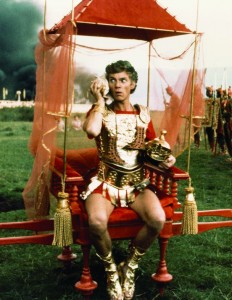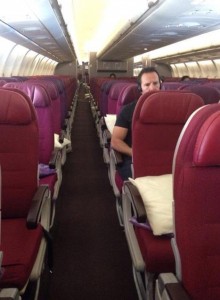Qantas announced its financial results today. Predictably, they were a car crash (Qantas still hasn’t had a plane crash [*], but they’re definitely a crash). $646 million operating loss, and $2.6 billion in one-off write-offs from revaluing the company’s aircraft fleet. No rock and roll fun.
Fiddling and burning
As Qantas CEO for the last six years, and about as many restructuring programs, much of the blame has fallen on Alan Joyce. “Alan Joyce is to Qantas what Caligula was to the Roman Empire”, said independent Senator Nick Xenophon, who never met an exaggeration he didn’t love.

And it’s true: while he hasn’t yet made his horse a board director, Joyce’s strategy has been something of a disaster. His approach to a long-term structural weakening in Qantas long-haul, combined with an epic boom in domestic demand, was to ignore the former (leaving the long-haul airline with a fleet of fuel-guzzling 747-400s, highly-efficient-when-full-but-hard-to-fill A380s, and senescent 767s up to the end of 2013), and deal with the latter by starting a price war with its only real domestic rival, smaller, lower-resourced, lower market share Virgin Australia. Although at least the domestic airline’s ageing planes were replaced with efficient new 737-800s.
Under Joyce, Qantas’s investment has been focused on expanding pan-Asian short-haul budget airline Jetstar, which has had modest success in Australia and Singapore, less success in Japan, embarrassment in Vietnam, and dismal failure to even get an operating license everywhere else (including Hong Kong, for which the airline bought six brand new A320s that have been sitting idle). Much of the failure has been due to Qantas’s and Joyce’s failure to understand the Asian operating environment, where the perception that the airline is controlled by local partners is vital to local regulators.
More recently, as long-haul became predictably loss-making, the airline has slashed services, cancelled further A380 deliveries, life-extended 747-400s up to the point where they’ll be welcomed in museums on decommissioning, postponed 787 deliveries (despite the fact that, due to Boeing’s program delays, the airline is due an exceptionally good price on its 787s), made no effort to lease 777s in order to decommission 747-400s, and negotiated a codeshare with its biggest international rival that hands over most of its long-haul services out of most Australian cities.
And rather than attempting to either blitz or alleviate Qantas’s troubled relationship with staff and their unions, Joyce ratcheted the tension up to maximum, closed the airline for a day to hold a lockout, and then stuck a band-aid over the wound.
So, yes, Joyce has been inept. But what about the environment he’s facing?
They can’t be better than us, so they must be cheating
A lot of cant is talked about this, partly because local airlines in rich-people countries are very good at placing PR stories in the media, and partly because it’s the only area where rich-people country airlines and airline staff have aligned incentives. The general story is that it’s grossly unfair that airlines like Qantas are losing out, because their rivals in less-rich-people countries are “government sponsored foreign airlines with unlimited piles of cash”.

Anyone using this lie should be banned from aviation commentary. It is a bullshit excuse used to defend the incompetent management & overpaid staff of legacy airlines in rich-people countries from profitable foreign rivals.
Looking at airlines that could be considered Qantas’s competitors, Emirates is immensely profitable; it does not have any state subsidy. Singapore Airlines and Air New Zealand, both major shareholders in Virgin Australia, and Cathay Pacific are all slightly less profitable, but also unsubsidised. The remaining foreign government-controlled airlines that run on subsidy are basket cases that can’t fill their seats anyway: Malaysian Airlines, Air India, Alitalia.
The alleged indirect subsidies that critics like to pretend Qantas’s rivals receive are also illusory. Yes, fuel is cheaper in Dubai than it is in Sydney. But the economics of long-haul air travel are such that you have to refuel every time you land, so a Qantas flight that goes Sydney-Dubai-London has exactly the same fuel cost as an Emirates flight that does the same. It’s also true that company profits are taxed less in Dubai than they are in Australia, but you need to be making a profit in the first place before anyone taxes it.
The problem is, if you are an airline with new planes, new IT systems, and staff recruited on current contracts, you have a hell of a cost base advantage over an airline which doesn’t. This is highlighted by, um, Jetstar and Virgin Australia, never mind the foreign rivals. The foreign rivals also have the advantage of being on the way between somewhere and somewhere (with the exception of Air New Zealand, which really doesn’t).
The “cheating” narrative exists, of course, because it’s a first step in the one cause that unites unions and management everywhere: extorting money from the taxpayer to preserve unviable business models. Once you’ve established the trope that it’s unfair of Emirates and Cathay Pacific to steal all of Qantas’s international passengers using their home advantage, a subsidy to ‘level the playing field’ is a logical next step. To the current Australian government’s credit [**], it doesn’t so far seem to be showing any signs of playing ball.
Portrait of the CEO as a doomed man
Alan Joyce said in the results statement, “We expect a rapid improvement in the Group’s financial performance – and a return to Underlying PBT profit in the first half of FY15, subject to factors outside our control”. Note that ‘factors outside our control’ here means whatever he wants it to, like Humpty Dumpty. And note that he has said variations on this theme at almost every results announcement so far.

Things should be less terrible for the airline going forward. The various doomed attempts to forge new Asian carriers seem to have been dropped; Qantas has addressed some of the terrible usage patterns of its international fleet (no longer leaving $300m aircraft parked up in London for 20 hours a day), 2,500 of the 5,000 layoffs in February have actually been made; and the write-off to aircraft values will save about $200m a year in depreciation charges. If not quite profit, that would seem to be enough to keep the airline’s loss manageable given its cash in the bank.
But while Qantas’s future is reasonably secure, Alan Joyce’s surely can’t be. The results today were greeted with near-universal incredulity that he hadn’t been sacked already, given the sheer number of times he’s come forward with another round of sorry apologies, another insane unworkable Asian solution, and failed to save money on the core business. He’s a hate figure for the airline’s staff and the Australian public.
So why hasn’t he been, then? There are two possible alternatives:
1) As with the sacking of BP CEO Tony Hayward following the Deepwater Horizon disaster, there is no point in bringing in the untainted CEO until the worst of the disaster is over. Joyce’s head needs to roll, but this might as well happen in six months when the current cost-cutting program is complete and it’s time to make longer term strategy decisions again; or
2) Australian business is utterly nepotistic and corrupt, with supine boards made up of drinking buddies who cosily tolerate each other’s incompetence no matter how gross.
We’ll see which it is over the next 12 months. Meanwhile, if I were the chairman at Qantas, I’d offer the Australian CEO of Abu Dhabi carrier Etihad, James Hogan, all of the money in the world and total free reign over all decisions to come home and repeat some of the magic he worked out in the desert.
[*] Fatal or hull-loss accident since the start of the jet era.
[**] Given the current Australian government’s performance at literally everything else, you have no idea how much this pains me to say.
““Alan Joyce is to Qantas what Caligula was to the Roman Empire”, said independent Senator Nick Xenophon, ”
There should be a joke about someone called Xenophon making allusions to Roman history.